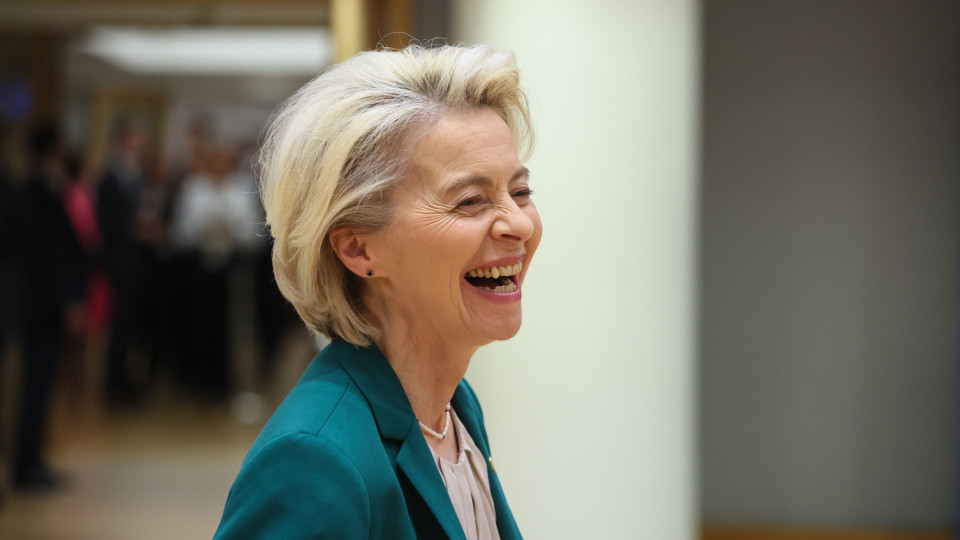Von der Leyen's re-election on track (but depends on new EP)
The re-election of Ursula von der Leyen to the head of the European Commission is "well on track" according to sources close to the current president of the institution, who nevertheless admit that approval depends on the composition of the new European Parliament (EP).

© Lusa

Mundo Comissão Europeia
Despite the fact that the Prime Minister of Hungary, Viktor Orbán, has been speaking out against the re-election of Ursula von der Leyen due to the differences between Brussels and Budapest regarding the violation of the rule of law and the consequent suspension of Community funds, it is not a possible Hungarian veto that worries the sources close to the candidate, but rather the expected fragmentation of the EP after the elections.
It is the EP that has to approve, after a proposal from the European Council, the new President of the Commission by an absolute majority (half of all MEPs plus one), with Ursula von der Leyen having to obtain the 'green light' from at least 361 parliamentarians (out of a total of 720 seats).
As the first woman to preside over the European Commission, Ursula von der Leyen was approved by the EP in July 2019 with 383 votes in favor, 327 against and 22 abstentions, in a close vote.
With what is expected to be greater party fragmentation, namely due to the rise of the far right, the official will now have to 'convince' the various parties that she deserves a second term at the head of the Community executive, according to sources heard by Lusa.
To this end, according to the same sources, Ursula von der Leyen intends to campaign actively and interact with national parties -- for which voters vote in the European elections -- with a view to counting on their support.
Next week, the last plenary session of this EP legislature will take place, with work resuming on July 16, when the new European assembly takes office and the first meeting of the new term is held.
The choice of the new President of the European Commission is also scheduled for that time, in a political discussion for the top positions in the EU that takes into account the result of the elections as well as the geographical and gender balance.
As for the top positions in the EU, the discussion in the summer will also focus on the choice of the new President of the European Council, a position that is expected to be occupied by a socialist, with two names being heard more in Brussels: that of the former Portuguese Prime Minister, António Costa, and that of the Spanish head of government, Pedro Sánchez.
Although the sources heard by Lusa consider it to be very early in the process, they believe that Costa still has a chance in the 'race', namely after the Lisbon Court of Appeal announced a few days ago that it had found no evidence of crimes in Operation Influencer and that the suspicions that fall on the former prime minister are based on speculation.
In early March, the EPP elected Ursula von der Leyen as its top candidate in these European elections. Ursula von der Leyen was not the party's 'Spitzenkandidat' in 2019.
Currently, the EP is composed of seven political groups, the EPP being the largest of them, followed by the Progressive Alliance of Socialists and Democrats, the parliamentary group of the Party of European Socialists (PES).
For the PES, the current Luxembourgish European Commissioner for Employment and Social Rights, Nicolas Schmit, was nominated as the 'Spitzenkandidat' of the socialist political family.
The figure of the main candidates -- in the German term 'Spitzenkandidat' -- emerged in the 2014 European elections, with the largest European parties presenting their choices for future President of the Commission.
Then, in 2019, an attempt was made to apply this model again, but, due to disagreement between the political groups, these main candidates did not occupy the top European positions, which is why Von der Leyen was chosen even though she was not the EPP's top candidate that year.
Read Also: Von der Leyen calls for restraint after alleged Israeli attack on Iran (Portuguese version)

Descarregue a nossa App gratuita.
Oitavo ano consecutivo Escolha do Consumidor para Imprensa Online e eleito o produto do ano 2024.
* Estudo da e Netsonda, nov. e dez. 2023 produtodoano- pt.com



